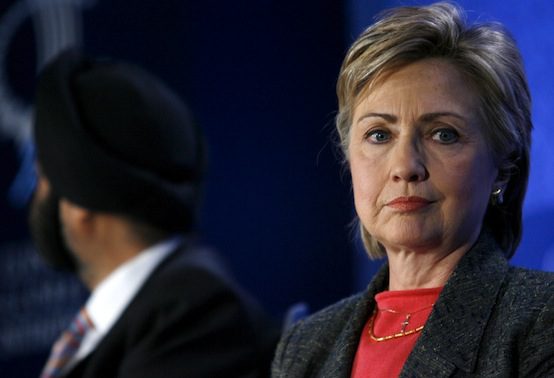Hillary’s Empty Book

I’ve been skimming Hillary Clinton’s State Department memoir Hard Choices, which stands at more than 600 pages. The massive tome, the product of Hillary and her “book team,” is in its way extremely skillful. Throughout the book Hillary appears engaged, intelligent, tough, compassionate—all qualities she obviously wants to project—while effectively muting any controversy that might be politically inconvenient as she pursues her next project. As we know, Hillary has no particular accomplishments as Secretary of State: she traveled extensively, and is able to describe in impressive detail various rooms and furnishings and personages. It has never been reported that she said anything embarrassing to herself or the country. But I haven’t found anything remotely like a “hard choice.” There was no moment when Hillary was in the White House situation room, trying to break down for a president the options about missiles in Cuba; no effort to brainstorm about escalation in Vietnam, or to decide whether Gorbachev was the real thing.
She supports the two-state solution of Israel-Palestine—though of course, as the administration’s commonly used phrase had it, “not more than the parties themselves”. She says nice things about former senator George Mitchell (Obama’s appointee as head Mideast peace processor—who was genuinely committed to a two-state solution) and also Dennis Ross, the epitome of a faux peace process-er who served, more or less, as Israel’s lawyer from his various appointments close to the center of power. The conflict between the two men was important and much speculated upon, but Hillary says not a word about it. Even those who want to attack Hillary from the perspective of the Israeli Right can’t find much to complain about: The Emergency Committee for Israel is running ads condemning her for not objecting publicly when John Kerry said Israel risked becoming an apartheid state. They can’t find anything in her actual record to fault.
And indeed what could there be? The peace process in the Middle East was doomed so long as Americans insisted it would strive to be even-handed between the military occupier and the occupied: this is about as sensible as the Justice Department facilitating even-handed talks between segregated blacks and the Mississippi power structure in 1960. If you want to change the situation, you have to acknowledge the power discrepancies and weigh in to equalize them. There was not the shadow of a chance Hillary would have favored that. Obama apparently believed that making speeches would suffice to change Israeli behavior.
The one place in her narrative where Hillary seems truly energized about a policy matter is lobbying UN member states to support tough sanctions on Iran. I suspect that when she enters the campaign trail she will tout this as her signal achievement—whatever happens with current negotiations. “She was tough enough to bring Iran to its knees.” might be the slogan. A thoughtful Secretary of State, writing at the end of his or her career, might speculate on why Iran would want a nuclear program—and presumably the potential to build a weapon. That question would be at the center of any serious foreign policy analysis. But there is none of that—no history, no mention of the American-supported attack on Iran by Saddam Hussein, or Israel’s introduction of nuclear weapons into the region.
The prominence of Hillary, and more, the absence of anyone who is willing to challenge her quest for the Democratic nomination, is a depressing indication about the state of the Democratic Party and the country. It tells us that there is no lasting impact of the Iraq war on elite Democratic party attitudes, it might as well have never happened. A couple of trillion dollars when the wounded veteran care is factored in. A million Iraqis homeless and refugees. Not only has Hillary not learned any lessons; no one else of prominence has either. There is no rethinking whether the United States needs to be poking its nose militarily in every spot in the globe—not by Hillary certainly, but seemingly not by any other leading Democrat, either.
Andy Bacevich’s Washington Rules contains substantial segments quoting Democratic senators prominent in the 1960s, especially Bill Fulbright and Mike Mansfield. At the time there were several top lawmakers seeking to figure out what went wrong—how we became immersed in Vietnam with no good way out, what that said about American attitudes, hubris, and self-delusion. There is eloquence there, and probing intelligence. There is none of that kind of soul-searching going on now on Capitol Hill, at least at the Senate level. Hillary Clinton, for her obvious wonkishness and impressive grasp of detail, certainly isn’t engaged in it. The sad thing is, no one seems to want her to be.